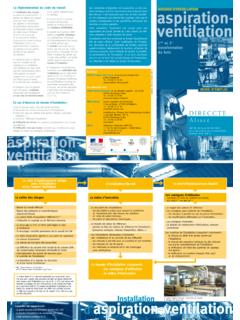Transcription of CAPB National Newsletter September 2004
1 In this Issue CAPB Activities Establishment of NewMembership Category 2004 ConferenceReview 2005 ConferenceNotice In the News: National & Provincial Upcoming Events People CAPB National September 2004 CAPB ActivitiesBest Practices in police Governance Research ProjectAt the annual CAPB conference held this year in Vancouver, CAPB President Ed Keyes formally announcedthe launch of an important research project entitled "Best Practices - A Framework for Professionalism andSuccess". Earlier this year the CAPB submitted a proposal to the Ministry of Public Safety and EmergencyPreparedness Canada for funding to conduct a research project into best practices in municipal policegovernance. Project funding has been approved and the project will be proceeding this fall.
2 In approvingthe project funding, the Ministry is acknowledging what many already know - that good governance is criticalto the success of any organization, and that bad governance can have dire results for any public or privateorganization. Municipal police services provide policing for every major urban centre in Canada. They police the vastmajority of the canadian population (as an example, 9 of every 10 Ontarians is policed by a municipal policeservice). Urban populations tend to attract new Canadians, which adds to the vitality and energy of thesecities, but also increases the complexity of successfully achieving the required partnership between policeand the community. Add to this the daunting realities of policing in a post 9/11 world and municipal policeservices are facing greater challenges than ever municipal police services are almost universally governed by part-time civilian members who, inaddition to providing strategic direction in response to a changing environment, must also deal with policyoversight responsibilities for multi-million dollar organizations.
3 Cities the size of Vancouver and Ottawa areclosing in on annual budgets of $200 million, with corresponding numbers for other urban CAPB over the past decade has embarked on two major initiatives to provide the tools to enhance andpromote professionalism in police governance bodies. In light of ongoingquestions and reviews taking place in the corporate, public and policesectors, the timing is right to undertake a research project to identify bestpractices in board governance, apply and test them in the municipalpolice sector, and develop a framework for their application throughoutthe project will: Undertake a review of developments in governance from allsectors, including commissions, inquiries, legislation and publicpolicy positions. It will focus its attention on recent activity inCanada, United States and England.
4 This will largely be aliterature review, with select interviews; Revise previous work on legislation governing municipal policeboards; Interview key stakeholder groups ( , municipal leaders, canadian association of Chiefs of police , canadian ProfessionalPolice association ), to determine opportunities, obstacles andissues concerning civilian governance of police ;..continued on page 2110 Laurier Avenue West, Ottawa, Ontario, K1P 1J1(613) 560-1312, Fax: (613) 580-2728, National September 20042 Best Practices inPolice Identify commonelements and initiativesthat are seen topromote success. Thiswill be reviewed withleading governancepractitioners; Create a menu of bestpractices and 'field-test'these with policeboards representingsmall, medium andlarge police services; Finalize and createprint and electronicdocumentation to beprovided to allmunicipal police sectorsand governing councilsthat provide concreteand practicalrecommendations thatrepresent a frameworkof best practices formunicipal focus of the project ison civilian governance ofmunicipal police , it is anticipatedthat the recommendationsand framework could beadapted to apply to abroader constituency or setof results of the researchproject will be presented atnext year's conference,followed by a period ofevaluation.
5 CAPB memberswill be hearing more aboutthe project as it progressesover the coming of New Associate MembershipCategoryAt the 2004 Annual Meeting, CAPB members approved the establishmentof an Associate Membership category. The criteria for AssociateMembership in the CAPB is as follows:Associate Membership in the CAPB may be granted by the Boardof Directors to any public or non-profit organization not eligible forfull membership that is engaged in policing, law enforcement,public safety, crime prevention, justice, corrections, municipalgovernment or governance. An Associate Member shall have allthe rights and privileges of regular membership, save and exceptvoting and holding office in the association . The CAPB board ofDirectors may waive an association membership fee upon receiptof a written request, and may also decline to grant an organizationan associate membership.
6 Examples of organizations that wouldbe eligible for associate membership include: RCMP and other advisory or community consultativecommittees Provincial and federal departments with responsibility for lawenforcement, public safety and security, crime prevention,justice or corrections Municipalities with police boards/commissions/committees police services in Canada Educational institutions with safety & security related faculties Municipal or police sector associations Other canadian organizations engaged full time in lawenforcement, public safety and security, crime prevention,justice or particular significance is that RCMP and other advisory or communityconsultative policing committees that do not meet the criteria for fullmembership will be eligible to become associate CAPB members.
7 Thecriteria for full membership stated in the General By-law permits Anymunicipal board , commission or committee with a legislated mandate togovern its local police service may become a member of the and community consultative committees, while having animportant role to play in providing recommendations and community inputto their Detachment Commander, do not usually have a legislatedmandate to govern the local police addition to having access to CAPB newsletters, bulletins, conferencereports and position papers as they have in the past, Associate Memberswill be eligible to receive a discounted conference rate and will haveaccess to the members only section of the website where the Members Directory, Sample Policy Database, Catalogue of Resource Material, board Orientation information and reference documents are annual associate membership fee has been set at $250 for RCMPand other advisory or community consultative policing committees and at$500 for all other organizations, to be reviewed on an annual basis by theBoard of Directors.
8 Further details will be available later this National September 20043 canadian association OF police BOARDS 2004 CONFERENCEThe 2004 CAPB Conference was held in Vancouver, British Columbia from August 18-21, on the theme of Protecting Our Children . A comprehensive report on the Conference will be published later this brief overview including highlights and new developments are noted Conference began with a keynote speech from Ms. Cherry Kingsley, Special Advisor for the InternationalCentre to Combat Exploitation of Children, who spoke poignantly about her own experiences as a child victimof violence, neglect, sexual exploitation and drug addiction. She gave delegates an idea of the internationalscope of the problem, and the work she is involved in to reduce the sexual exploitation of women and concluded by providing advice on what she believed the police community could do to combat childsexual exploitation and assist its Kingsley was followed by RCMP Assistant Commissioner Mike Buisson, Chief, National police Services,whose portfolio includes Canada s National Child Exploitation Coordination Centre.
9 His presentation coveredthe activities of the National Centre, partnerships and initiatives undertaken by the law enforcement communityto combat child sexual exploitation, and G8 Law Enforcement objectives. He concluded by talking about whatpolice board members can do to help. The presentations of Ms. Kingsley and A/Commissioner Buisson werefollowed by a serious and stimulating next heard about three successful programs in which police are working with community partners todeliver programs for youth. The Kids 4 Success Kamp is run by the Delta police Department in collaborationwith the Boys and Girls Club of Delta. Constable Jim Poulin and Ms. Pam Profitt explained the program, whichassists youth in acquiring skills and understanding that will help them avoid becoming involved in Paul Brookes and Peter Gill from the Victoria police Department ran the first Youth CombatingIntolerance Camp in October 2003.
10 The event was attended by 68 students and leaders, including teachersand police officers, and focused on teaching youth skills that will help them cope with issues such as bullying,racism and intolerance. The successful program will be offered again later this year. The third example was aunique program run by the Vancouver police Department called Fight Against Child Exploitation, also knownas FACES. Detective Constable Russ Mitchell explained the program, which began in 1996 as a result ofdisturbing trends in prostitution involving juveniles. FACES aims to identify, locate and rescue children andadolescents in the sex the last day of the conference, Vancouver police Department Detective Constables Oscar Ramos andRaymond Payette delivered a presentation on an innovative program they designed the Deter and IdentifySex Trade Consumers ( ) Program.







